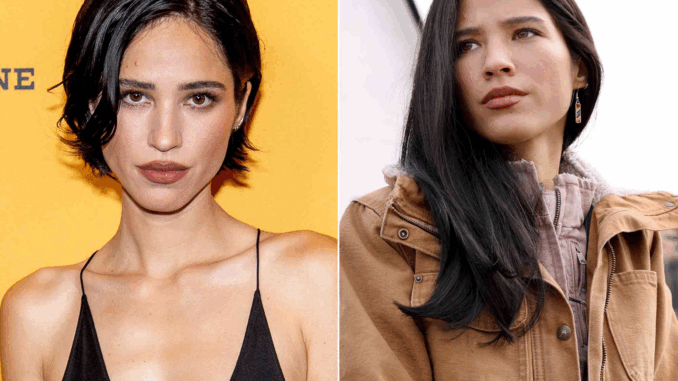
Kelsey Asbille, known for her role as Monica Dutton in the hit series Yellowstone, has recently found herself at the center of a cultural debate. While her portrayal of a Native American character has garnered praise from audiences, questions have arisen regarding her claimed Cherokee heritage. This article delves into the controversy surrounding Asbille’s casting and the broader implications for Native American representation in Hollywood.
The Role of Monica Dutton
Monica Dutton, portrayed by Kelsey Asbille, is a pivotal character in Yellowstone. As the wife of Kayce Dutton, Monica’s storyline intertwines with themes of cultural identity, family, and the complexities of modern Native American life. Her character has been instrumental in bringing Native American issues to the forefront of mainstream television.
Kelsey Asbille’s Heritage Claims
In a 2017 interview with The New York Times, Kelsey Asbille stated that she was of Eastern Band Cherokee descent, describing her connection to Native American culture as “in [her] blood.” This revelation added depth to her portrayal of Monica Dutton, suggesting a personal connection to the character’s background.
The Eastern Band Cherokee’s Response
Following Asbille’s claims, actor and producer Sonny Skyhawk reached out to the Eastern Band of Cherokee Indians to verify her ancestry. The tribe’s Tribal Enrollment Office responded, stating that they had no record of Asbille and could find no evidence supporting her claim of Cherokee descent. This official statement raised questions about the authenticity of her heritage claims.
Public Reaction and Backlash
The tribe’s denial sparked a wave of criticism from Native American communities and allies. Actor Adam Beach led a boycott movement, urging Native actors to distance themselves from Yellowstone. He expressed that the casting of Asbille, who is of Chinese and British descent, to portray a Native American character was an example of Hollywood overlooking Native talent.
The Debate Over Cultural Appropriation
The controversy has ignited a broader conversation about cultural appropriation in the entertainment industry. Critics argue that casting non-Native actors in Native roles perpetuates stereotypes and denies opportunities to Native performers. Supporters of Asbille’s casting contend that her portrayal brings attention to important issues affecting Native communities.
Hollywood’s History with Native American Representation
Hollywood has a long history of misrepresenting Native Americans, often casting non-Native actors in Native roles. This practice has contributed to the marginalization of Native voices in the industry. The debate over Asbille’s casting highlights ongoing concerns about representation and authenticity in film and television.
The Importance of Authentic Representation
Authentic representation is crucial in accurately depicting the experiences and cultures of marginalized communities. Native American actors and creators emphasize the need for stories to be told by those who have lived them, ensuring that narratives are respectful and true to life.
Kelsey Asbille’s Response
As of now, Kelsey Asbille has not publicly addressed the controversy surrounding her heritage claims. Her silence has been interpreted in various ways, with some viewing it as an attempt to avoid further scrutiny, while others believe it reflects the complexities of navigating identity in the public eye.
The Impact on Native American Actors
The controversy underscores the challenges faced by Native American actors in an industry that often favors non-Native talent. Many Native performers express frustration over the lack of opportunities and the tendency to cast non-Native actors in roles that should go to Indigenous individuals.
The Role of Audiences in Shaping Representation
Audiences play a significant role in influencing casting decisions and the portrayal of cultures in media. By voicing their opinions and supporting authentic representation, viewers can contribute to positive change in the entertainment industry.
Conclusion
The debate over Kelsey Asbille’s casting in Yellowstone serves as a microcosm of larger issues related to Native American representation in Hollywood. While Asbille’s performance as Monica Dutton has been praised, the controversy surrounding her heritage claims highlights the need for greater authenticity and inclusion in the industry. As the conversation continues, it is essential to prioritize the voices and stories of Native American communities to ensure accurate and respectful representation.
FAQs
1. What is the controversy surrounding Kelsey Asbille’s role in Yellowstone?
The controversy centers on Asbille’s claims of Cherokee heritage, which the Eastern Band of Cherokee Indians have denied, raising questions about cultural appropriation and representation.
2. How has the Native American community responded to Asbille’s casting?
Many Native American actors and activists have criticized the casting, with some calling for a boycott of Yellowstone and advocating for authentic Native representation.
3. Has Kelsey Asbille addressed the controversy?
As of now, Asbille has not publicly commented on the controversy regarding her heritage claims.
4. Why is authentic representation important in Hollywood?
Authentic representation ensures that stories are told accurately and respectfully, providing opportunities for marginalized communities to share their experiences.
5. What can audiences do to support Native American representation in media?
Audiences can support Native American representation by advocating for authentic casting, supporting Indigenous creators, and consuming media that accurately portrays Native cultures.
